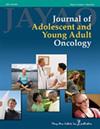新近确诊癌症的青少年的社交焦虑症状。
IF 1.2
4区 医学
Q4 ONCOLOGY
引用次数: 0
摘要
目的:社交焦虑症(SAD)仍然是癌症经历与青少年和青年癌症幸存者不良社会心理后果之间的一个未被充分研究的潜在联系。我们调查了青少年癌症患者出现社交焦虑症症状的频率、持续时间以及相关因素。研究方法这项纵向混合方法研究包括在招募时和 6 个月后进行的在线调查(包括经过验证的 SAD 筛查工具)以及结构化临床访谈。研究结果28 名青少年患者(年龄在 12-30 岁之间,确诊后不足 1 年,50% 为男性)完成了首次调查(M = 确诊后 6 个月)。约 32% 的人报告有明显的 SAD 临床症状。14 人完成了后续调查(M = 诊断后 12 个月),其中 9 人(62%)报告了持续或更严重的 SAD 症状,这些症状与情绪困扰、身体外观问题、消极社交认知和抑郁密切相关。结论一部分罹患癌症的青少年可能会出现明显的临床自闭症状,这可能会影响他们的社会心理健康。我们需要进一步研究如何更好地识别和支持患有 SAD 的亚健康人群。本文章由计算机程序翻译,如有差异,请以英文原文为准。
Social Anxiety Symptoms in Adolescents and Young Adults Recently Diagnosed with Cancer.
Purpose: Social anxiety disorder (SAD) remains an understudied potential link between the cancer experience and adolescent and young adult (AYA) cancer survivors' poor psychosocial outcomes. We investigated the frequency and duration of, as well as factors associated with, symptoms of SAD among AYAs with cancer. Methods: This longitudinal, mixed-methods study involved online surveys (including a validated screening tool for SAD) at recruitment and 6 months later, and a structured clinical interview. Results: Twenty-eight AYAs (aged 12-30 years, <1-year postdiagnosis, 50% male) completed the first survey (M = 6 months postdiagnosis). About 32% reported clinically significant SAD symptoms. Fourteen completed the follow-up survey (M = 12 months postdiagnosis), of which 9 (62%) reported persistent or worse symptoms of SAD significantly associated with emotional distress, physical appearance concerns, negative social cognitions, and depression. Conclusion: A subset of AYAs with cancer may experience clinically significant SAD symptoms that can affect their psychosocial well-being. Further work on how to best identify and support AYAs with SAD is needed.
求助全文
通过发布文献求助,成功后即可免费获取论文全文。
去求助
来源期刊
CiteScore
3.70
自引率
15.00%
发文量
114
期刊介绍:
Journal of Adolescent and Young Adult Oncology (JAYAO) breaks new ground as the first cancer journal dedicated to all aspects of adolescent and young adult (AYA)-aged cancer patients and survivors. JAYAO is the only central forum for peer-reviewed articles, reviews, and research in the field, bringing together all AYA oncology stakeholders and professionals across disciplines, including clinicians, researchers, psychosocial and supportive care providers, and pediatric and adult cancer institutions.

 求助内容:
求助内容: 应助结果提醒方式:
应助结果提醒方式:


